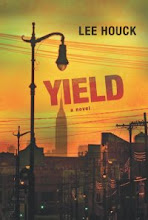Yesterday afternoon, I went to see the Roundabout Theatre's production of "Waiting for Godot," starring, "in order of speaking," as the notes go, Nathan Lane, Bill Irwin, John Goodman and John Glover. Granted, it was only their third preview performance--not a lot of time to sink into the roles, to really explore the immense depth (and difficulty) that Beckett has to offer. So I'm not sure if my feelings about the show are really dictated by the newness of the performances, or if what I kept thinking was actually the case: That the play is written and structured in such a way that it will never again be new.
Now, I realize that the play is one of the great works of the century, and that people will think I am crazy--okay, maybe not everyone--for thinking this, but, it has some really clunky spots that actors and directors never seem to know what to do with. I was in the show once, as Vladimir, and aside from how much of the script I remembered even more than ten years later, I kept noticing that the awkward sections that we dealt with way back then are the same ones that Nathan Lane and Bill Irwin struggled to make right. I can't help but think that no one knows how to fix this.
I'm not sure if it's Beckett's estate keeping anyone from fucking with the material in a larger way, or if people are so enamored with it, with the play's posture and "meaningfulness" throughout the last fifty or so years, that it's impossible for it to look different. Yes, the stage directions are very clear, yes the set is spelled out, but I've never seen the play when it didn't feel like the same old show. The reinterpretations never really escape the text, whether the actors are amazing, Tony Award-winners or high school students. Even with the superb performances and beautiful set and lovely lighting, the Roundabout's production ends up looks like a museum piece. I can't help but thinking...yes, and?
This is not because of the actors. They are all fantastic. Nathan Lane, as Estragon, is so relaxed on stage, and the director allows him some of the freewheeling silliness that makes him so charming and hilarious--hamming it up every now and then. Bill Irwin, whom I fell even more in love with after seeing him in the revival of "Who's Afraid of Virginia Woolf," manages to slip in some surprising clowny bits, and uses his physical comedy experiece beautifully. He also manages to somehow become as thin and slight as the tree, periodically appearing like nothing more than a vertical line stuck into the dirt. John Goodman plays Pozzo lovingly, sort of helplessly, and it makes the horrendous nature of it all the more disturbing. Finally, John Glover is one of the most crushing, sad, insanely-good Lucky's I have ever seen. He is extraordinary.
There was a big fluff-up before the show started--some older ladies seemed to think that the seats were just, you know, for whomever wanted them. "I think we'll move down here," one of them said. The party arrived whose tickets matched those seats and the usher came to resolve the situation. "No, no," the older lady said, "We have to sit on the end because we have to leave immediately following the performance." "This man is so tall," the rest of them were saying too loudly of the man in front of them. Two of them produced thick chunks of foam from their enormous bags, which they sat on in order to lift them a bit higher. Naturally, none of us behind them now could see--and the good usher handled them more patiently than the rest of us wanted to. Most people gave a standing ovation, which doesn't mean anything these days in Broadway houses--people pay $125 to see something they want the Standing O to finish the experience for them, they need to resolve the narrative. When the house lights came back on, the one lady, who had been successfully moved to the aisle, said to her friend: "Well, what do you think happens to them now?"
Subscribe to:
Post Comments (Atom)



No comments:
Post a Comment